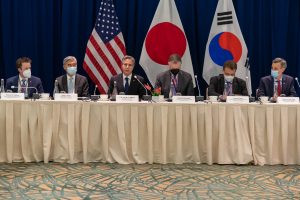South Korea’s President Yoon Suk-yeol and Japanese Prime Minister Kishida Fumio held a crucial summit meeting in Tokyo on March 16. This was the first true summit meeting between the two neighboring countries in 12 years, not counting their leaders’ short encounters at international events.
By any measure, the summit was a turning point for the two countries. The past 12 years have seen the lowest point of the Japan-South Korea relations since ties were normalized. Triggered by complex legal issues and court cases since 2011 relating to compensation for Korean victims during the Japanese colonial occupation, the two countries quickly went down a spiral of diplomatic and economic confrontation. In 2018, the two otherwise closely connected economic partners exchanged sanctions, even virtually suspending the General Security of Military Information Agreement (GSOMIA), a crucial legal instrument for exchange of military information in and around the Korean Peninsula, most notably information on North Korean missiles and nuclear programs.
The Kishida-Yoon summit on March 16 decided to close this chapter of a decade-long confrontation – an important stride in bilateral relations, indeed.
The past decade has been a difficult time for the United States as well. Washington’s two closest allies in Asia were digging their heels in over an unprecedented standoff at a time when their close cooperation was pivotal. That must have been embarrassing and distressing for Washington. Not surprisingly, the United States wholeheartedly welcomed the recent thaw.
Now that Seoul and Tokyo are starting a new chapter, there is one thing worth noting. During the Japan-South Korea tussle, the United States largely remained silent. Even while the dispute seemed to be growing into an unbridgeable fissure, Washington largely stood on the sidelines, except for some sporadic rhetoric of concern and hope. Of course, the passive stance makes sense, not taking sides in a dispute between two close friends is often times wise and prudent.
Over time, it had become clear that the continuing escalation of the Seoul-Tokyo confrontation stood to threaten the very structure of the tripartite cooperation, based on South Korea-U.S and Japan-U.S. alliance. And yet, U.S. intervention was hardly noticeable. In retrospect, Washington should have played a more active role as a good faith intermediary. With active U.S. mediation, the two countries could have found ground for compromise sooner. Needless to say, the necessary decisions must be made by the two countries, but strong U.S. assertion in the spirit of honest brokerage would have exerted crucial influence on both Seoul and Tokyo.
As South Korea and Japan try to mend their relations now, there are many lessons to learn, experiences to archive, and loose ends to tighten. These are mostly homework for two countries for the future. At the same time, there are things that the United States could do to help the two allies continue to move forward.
South Korea and Japan agreed at the March summit to enhance cooperation in economic security. Economic security is currently one of the most important topics for the two countries, covering crucial materials and technologies like batteries, semiconductors, rare earths, artificial intelligence, and the like. The United States should seize the momentum and build on this agreement. It should lead an initiative to form a Japan-South Korea-U.S. trilateral partnership where the three countries can discuss various issues relating to economic security and pursue deeper cooperation at this critical time.
Granted, these issues are already being discussed by the three countries using existing diplomatic platforms. But the current platforms are arguably not suitable for a wide range of newly emerging issues. Semiconductors are one example. Batteries are another one. These are economic and trade issues, but also constitute a central pillar of national security and military alliance, a situation that has fostered the very concept of economic security. Faced with military threats in the region and struggling with unprecedented challenges in formulating a new global economic regime, the three countries share a unique position. No other country is more acutely exposed to the concept of economic security than Japan, South Korea, and the United States are.
Mindful of this and taking advantage of this opportunity stemming from the March summit, the United States can lead to form a new trilateral partnership for economic security. This arrangement will address the most important national agenda items for South Korea and Japan at present, which will then harness the two countries for close cooperation. It will provide a systemic scheme to lock the two countries in for further cooperation in the future. With tangible benefits at hand, Seoul and Tokyo would do everything to avoid any possible repetition of their recent confrontation.
Second, in case a similar dispute arises in the future between Seoul and Tokyo, Washington should take a more active role to mediate. The United States knows exactly what South Korea argues and what Japan counter-argues and vice versa. Washington can hear from each, and offer a compromise package. Could Seoul and Tokyo easily disregard a carefully contemplated U.S. compromise package?
The key question is seriousness and willingness on the part of the United States. Washington cannot afford to be a mere concerned bystander in these circumstances. It should engage and engage seriously, so that any future dispute of this kind is contained early on and does not spill over into the trilateral security partnership.
Learning from the past and plan for a better future, it is time to ring the bell. As South Korea and Japan try to overcome their decade of contention, the United States should explore various ways to stabilize and secure trilateral cooperation at this crucial juncture. Their trilateral cooperation is well positioned and structured in the military sector, but there is still a long way to go in the economic sector. Most important, trilateral cooperation in economic security will offer the strongest incentive for South Korea and Japan to further stabilize their bilateral relations. Yoon’s state visit to the United States this week will be an important occasion in this regard.

































